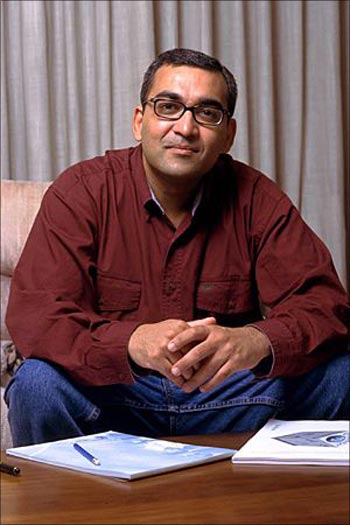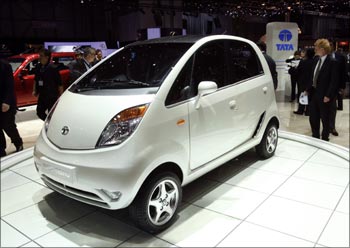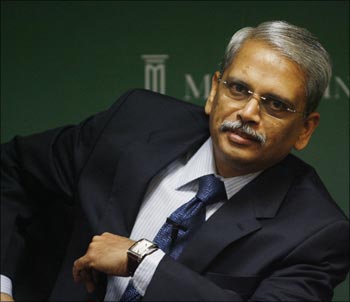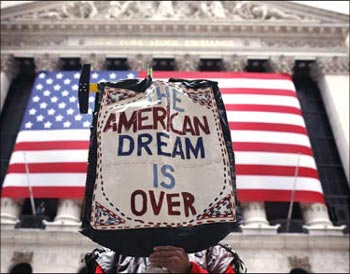 | « Back to article | Print this article |
'Don't assume the 21st century belongs to India by default'
Aseem Prakash, author of the book Midnight Economy: The New Business Order Emerging from the Shadows, argued in a recent BusinessWeek article that economic power is shifting towards the East and that many in business do not need the American dream anymore.
Toronto-based Prakash -- whose book will hit stores by Christmas -- is a former chief executive officer of I Media Corporation. Since 1984, he has worked in leadership roles in India, New Zealand, Hong Kong, Australia, the United States and Canada. Excerpts from an interview:
What made you write the book? What is the point that you are driving home?
Everybody knows that the world of business is changing rapidly and radically. People around the world recognize that old assumptions have stopped working. Everybody is pausing and evaluating their options.
Businesses know that they can no longer depend on the methods and models that they have been using for decades. So, the question is, what does the world of business look like going forward and how does it affect the jobs and companies?
In the past, you would look to the United States for answers. Or, you would make changes in some parts of your business. After that, it was business as usual.
But, now, the world of business that you are familiar with no longer exists. What is emerging is not a mutation of the Western, Japanese or local scenarios that you might already know. Everything is going through a fundamental transformation.
I wanted to understand what the new, emerging world of business looks like and how it changes things.
Click on NEXT to read on further. . .
'Don't assume the 21st century belongs to India by default'
Could you cite an example of the new business order in the context of India?
Let's take a look at the Nano from Tata Motors. I know that everybody is talking about it these days. A few years ago, you wouldn't have the ability to do that kind of innovation in places like India or else you would build those products for the US consumer, the old shoppers of the world.
Today, you not only can build products like Nano locally but you are making them for locals. But, the thing that fascinates me is this: Tata Motors is inspiring innovations in places like Africa.
Earlier, people looked to the US or Western Europe or Japan. Finally, and this is something that really took me by surprise, while the Nano has a huge potential and untapped market in places like Africa, countries in Africa are not waiting for Nano.
They are not taking a small car from Europe or China either. Instead, a bunch of Ugandan students has built a Nano-like prototype for Africa.
Things are changing incredibly fast. The window of opportunity is extremely small. There is no guarantee who will wear the crown of leadership or innovation and for how long.
'Don't assume the 21st century belongs to India by default'
Kishore Mahbubani and Fareed Zakaria have made the point in their books that while there is no decline of America, other centers of excellence are emerging in developing countries, including in Asia. What is your view?
The world of business is getting radically reconfigured. The US is no longer the only center of gravity. New hubs are emerging around the world.
Markets may be getting integrated economically and financially but they are also becoming heavily protected floating islands -- disconnected from the US.
But my book is not about whether America is declining or Asia is rising. I am not comparing the two positions or why one side is going down and other is coming up.
What I am saying in the book is that the old, standard template that the world of business has been using for generations has become obsolete.
Let me give you an example of what I mean by the standard template. Take a look at the MBA degree. Why or how is an MBA from Boston able to work in Budapest, Beijing or Bangalore and vice versa? It is possible because the world of business all over the world works off the same template.
We have the same set of functions but we execute differently. We conduct business in ways that are unique to our cultures. But, our assumptions, executions and measurements are the same -- the same cookie-cutter approach.
My book tells you that there is a fundamental shift in how we have done things in the past and how we might do things in future. What is emerging from the shadows is not just coming from the US. The new face of business is made up of examples from all over the world.
'Don't assume the 21st century belongs to India by default'
You recently wrote an article in BusinessWeek where you mentioned: 'For a long time when Americans went to sleep at night, the world waited impatiently for them to get up the next morning. . . the world is no longer waiting for Americans to wake up.' Can you elaborate on this?
The idea for the article, Is the US Still Relevant, came to my mind when I was researching for my book. Although there are many angles, let me give you two scenarios.
First, the pillars of economic progress -- money, talent, ideas and technology -- were located mostly in the US. Now, they are scattered all over the world. So, why do I have to wait for Americans to wake up?
Second, if you are a company, say, Infosys or anybody else, that has spent a fortune in building a company that gets most of its revenue from the US, what do I do now -- especially now -- when the US is changing and going in a new direction? So, if going forward, I have to raise capital from the local stock market or state-owned bank, focus on customers in my own country and make money domestically or from other markets around the world.
Then, what roles does America play in my new strategy? That is the question that I was asking myself.
'Don't assume the 21st century belongs to India by default'
But it does not seem that the new emerging business order is having an impact on politicians, policymakers and business executives. Or is it?
The answer is yes and no. Yes, it is having an impact. There is a mob anger building everywhere. It has not, fortunately, turned into any major social disorder yet.
But, an average person on the street -- especially those who have lost their jobs, homes, savings and lifestyles -- feels that the system does not work for them. The economy may be coming out of the woods. The stock market may be booming again. But the pain and suffering of tens of millions of people around the world has not gone away.
You would be a fool to be not paying attention to what is happening on the street.
The other side of the coin is that the government in the US has wasted a unique opportunity. It has gone inside all kinds of companies and industries but has failed to make fundamental changes.
China could have used the opportunity to kickstart domestic consumption. Russia could have planted the seeds to diversify its economy. India could have created a new foundation for the future. But everybody was focused on stabilising the heavily bleeding body.
Now, that the patient is in the recovery room, businesses will have to grapple with fundamental issues: What kinds of products do I make for the frugal, frightened consumer? Can I make money with the way I currently do business? Do we have the right structure and skills in place?
Progressive companies are asking these questions. But as other companies begin to deal with the new realities, I think they will be forced to make more painful choices.
What is going on is so fundamentally different that it is not just the companies or citizens that are suffering. Cities and countries are also collapsing. Who would have thought that California would be on its knees?
'Don't assume the 21st century belongs to India by default'
Even before the crisis, the domestic savings rate has been much higher in India than in the US. Now the US consumer is behaving like a developing country consumer; people are drastically cutting down on expenditure, which may not be a good sign from the point of economic recovery. Do you think consumer behaviour will change once the economy bounces back to normal?
It is a very difficult question to answer. Nobody knows what is going to happen tomorrow. Some people think that the next economic crisis is around the corner. What has happened was not an isolated tornado that went through a small area and affected the lives of few unlucky ones.
Personal wealth of the US households has gone down by many trillions of dollars. People who thought they were joining the American Dream and were now a part of the middle class in their countries have either lost everything or come down several notches.
Lifestyles are changing for everybody around the world. There is a fundamental change in the behaviour of the US consumer. In the past, low-cost meant cheap, unreliable and from the Third World. Now, low-cost is the new permanent reality for both businesses and their customers.
'Don't assume the 21st century belongs to India by default'
Are you bothered by the fact that people are not spending money?
How can people spend money when their trust in the system is broken and they are frightened about the future? People are very disillusioned about what is going on.
The days of borrow-and-blow are over. If I am a company located in China or India or Germany or someplace else and I have a business that is directly dependent on the US consumer, I have to now figure out what to do with my strategy, structure and systems.
A few months ago President Obama said that there would be no tax rebate to companies shipping jobs overseas and putting their earnings in tax havens indefinitely. Your take?
I think sometimes people make statements because they are popular. It does not mean that they are going to do it.
However, while it is hard to judge from outside what is going on inside the White House, one thing is clear: You cannot rebuild any economy without creating local jobs. And, you cannot create local jobs if you keep shipping them overseas. That is why I keep saying that a new business order is developing everywhere and the rules of the game are changing quickly.
Earlier, the focus was on globalisation. Now, companies, countries and citizens will have to think local to rebuild lives and economies. It does not mean that globalisation will disappear. But, I think it will take a new shape. You will not engage in globalisation the same old ways as before.
'Don't assume the 21st century belongs to India by default'
Are you saying that outsourcing of jobs is going to harm the US economy in terms of job creation?
I think the old argument that outsourcing helps you cut costs, makes you competitive and gives you an opportunity to grow the business so that you can hire more people, while still valid, is no longer as convincing as before.
Whether it is the US customer that has become frugal or it is a low-income consumer in the developing world, the challenge for American companies now is how to build innovative low-cost products and business models without changing the existing structure completely and displacing more people. It is a no-win situation.
What advice will you offer to businesses now?
I don't think anyone can tell you what to do when the world of business is changing in ways not seen before. But, there are some thoughts -- I developed while working on the book -- which I could share.
First, you can no longer depend on the past. Change your perceptions. Throw away expressions like 'best practices' or 'next practices' or 'sustainable advantage' or 'world-class innovation'.
Second, if you want to stay relevant and stand tall, innovate your own future.
Third, there is no template for success for anyone anywhere anymore. Stop wasting time looking for one or copying someone else's formula.
Fourth, innovation -- that is on everybody's tongue these days as if it is a cure-all solution -- is not the finish line like an objective to achieve. It is the starting point. But, remember, no company, culture or country controls ideas or intelligence anymore.
'Don't assume the 21st century belongs to India by default'
Is the 21st century is going to be the century of Asia, particularly of India and China?
I think that's a myth. For sure, China and India will continue to become more powerful in terms of wealth, influence and innovation. They will define and develop the 21st century in all kinds of ways.
But, they should not forget two things: First, the West is miles ahead of them in areas that China and India are aspiring to achieve. The US may be down but is not dead.
Second, the whole continent of Africa, countries of South America and other nations in Asia and the Middle East are hungry to join the global marketplace and make their presence felt. Many of those countries are cheaper than China and India. They also have a talented and eager work force.
So, we should not automatically assume that the 21st century belongs to China and India by default.








